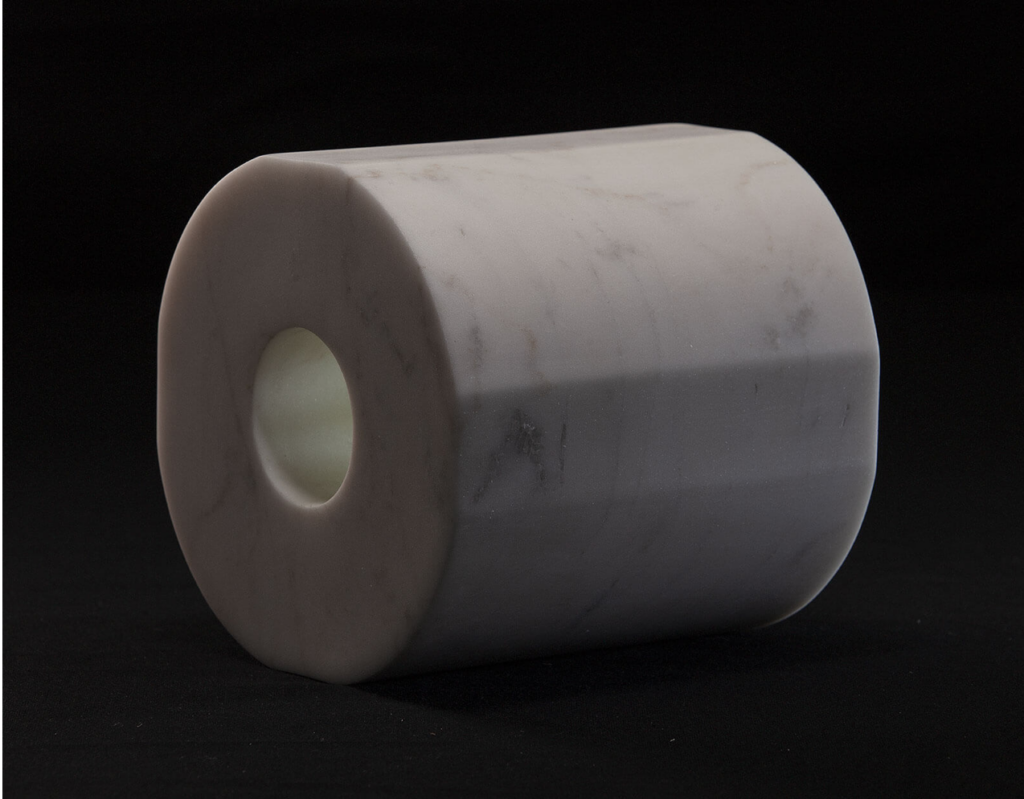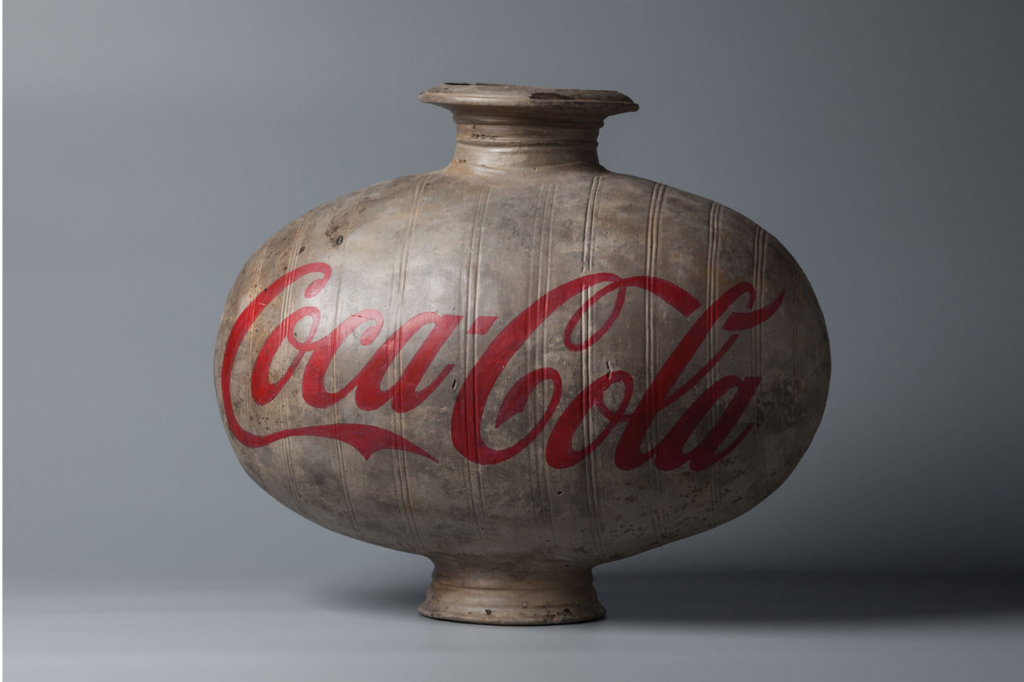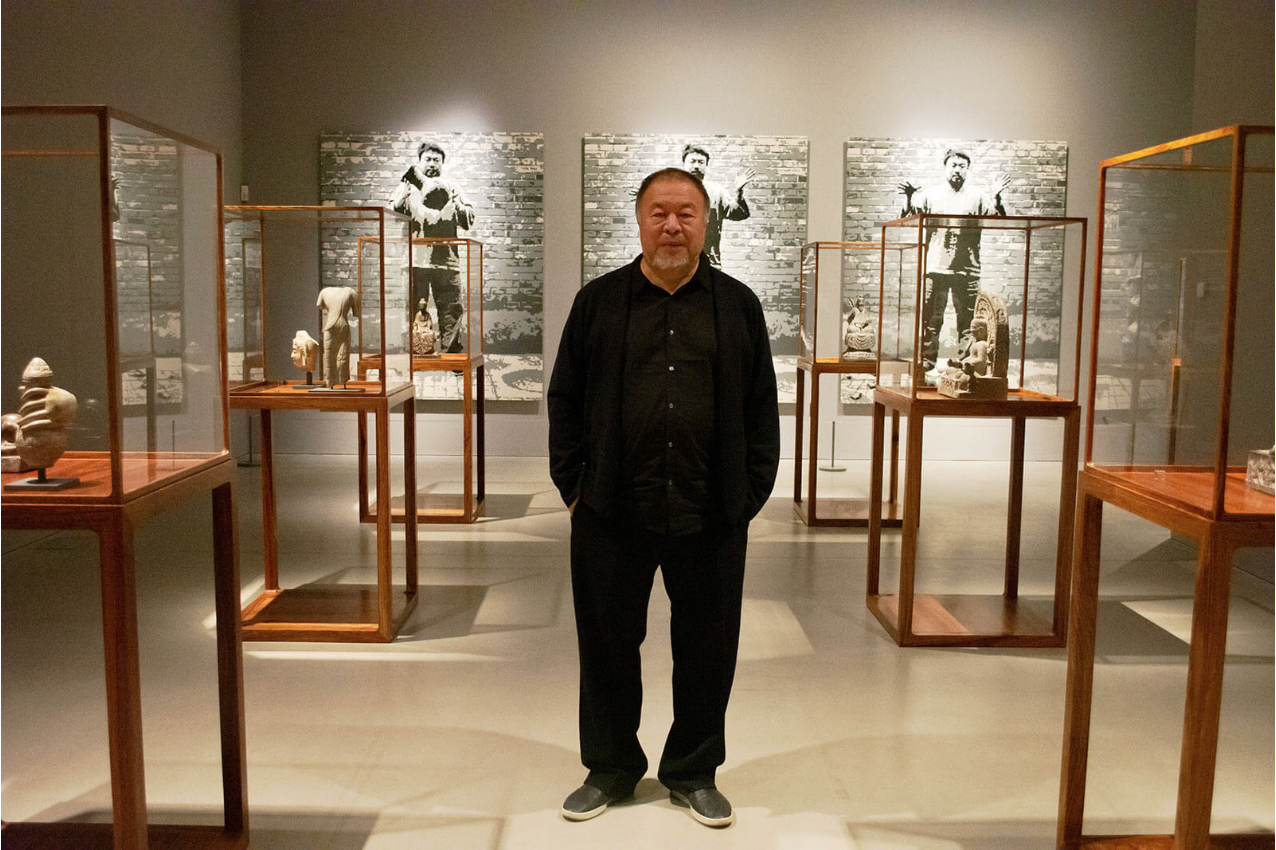Last week, my wife and I visited the Ai Weiwei exhibition, “The Liberty Of Doubt“, being held at the Kettle’s Yard art gallery in Cambridge. For those who are unfamiliar with Ai Weiwei, the best way to describe him is as an artist and activist: his recently published memoir, 1,000 Years Of Joys And Sorrows, is a wonderful book, combining a potted history of China from the early 20th century up to the current day with recollections from his father’s and his own life.
The art on display is definitely contemporary and, in some cases, quite challenging: representations in marble of such everyday items as a Styrofoam takeaway box, iPhone case and even a sex toy tested my art appreciation mettle! However, the skill with which these objects are rendered is unquestionable and the ambition of some of the pieces is on a scale that can best be described as mind blowing. His “Dropping a Han Dynasty Urn” at this exhibition (depicted above behind the artist), rendered in thousands of Lego pieces, is both ingenuous and controversial.
But as well as being a wonderfully inventive creative, billed as China’s foremost living artist, Ai Weiwei stands apart from his peers because of his outspoken defence of human rights, and in particular his championing of free speech and expression. As a man who says what he believes and refuses to be quiet he has, for many decades, been in conflict with the Chinese Communist Party (he currently lives in Portugal, though keeps a base in Cambridge, where his son goes to school, and a studio in Berlin). That conflict has not come without a personal cost, one that most of us would be unwilling to pay. He has been beaten by the police, severely enough to have suffered brain damage (in fact, one of his new pieces in the exhibition is a representation of the MRI performed after the beating), and he has been held, initially without charge but then on the grounds of tax evasion, in conditions of extreme confinement and loss of all personal autonomy. We can say honestly that he has suffered for his art.

And then there’s COVID-19. Given his pronouncements on the origins of the virus (it’s “obvious it isn’t natural… it’s something that leaked”) and his unabashed comments about vaccine mandates (“For or against the vaccine should be individuals’ autonomous decision, made for themselves and according to their social interaction, so society does not have the right to make vaccine compulsory”) it’s clear that his commitment to natural human rights is unwavering. Ever the individualist, Weiwei made his position about personal autonomy clear: “Regardless of the type of society, individuals are entitled to accurate information and then they can voluntarily collaborate with the Government or not. This decision should belong to individuals.” These statements are more than simply words, they drive his art which, in turn, appears as explicit and public manifestations of his commitment to freedom. Pieces showcased in the current exhibition include Handcuffs and Marble Toilet Paper (yes, it is a roll) which he made in 2020 as a “symbol of panic and distrust”.

So, given the totality of Weiwei’s output, the sheer essence of the man, it was extraordinary to witness the behaviour of the public while in the galleries. Nearly 100% of those we saw were wearing masks. While viewing the work of a man who has spent his life poking the bear of authority, and whose work is deeply political and celebrates the rights of the individual, the visitors seemed oblivious to the irony of sporting the most public expression of coercion and compliance. Perhaps these masked admirers of Ai Weiwei the artist hadn’t made the connection with Ai Weiwei the activist and lockdown sceptic; or they felt uncomfortable not demonstrating their membership of the cult of conformity (or perhaps they didn’t care). Either way, the cognitive dissonance was strong and left my wife and I both amused and frustrated, yet bemused: why should Cambridge, a highly esteemed centre of learning and academic excellence, be so full of fearers, adherents of the Cult of Covid and the useless face mask? It’s almost as if there’s an inverse relationship between IQ and old-fashioned common sense.
For those not familiar with Ai Weiwei, this is his life.
Born in 1957, in Beijing, his father, the poet Ai Qing, was labelled a “rightist” in 1958 and Ai and his family were exiled, first to Heilongjiang, in north-eastern China, and then soon after to the deserts of Xinjiang, in north-western China close to the Borth Korean border.
Following the death of Mao Zedong in 1976, Ai Qing was rehabilitated and the family moved back to Beijing. Ai enrolled at the Beijing Film Academy and was one of the original members of the ‘Stars’ group of artists.
He moved to the United States in 1981, living in New York between 1983 and 1993. He briefly studied at the Parsons School of Design. In New York, Ai would discover the works of Marcel Duchamp and Andy Warhol. Returning to China in 1993 to care for his ailing father, Ai contributed to the establishment of Beijing’s East Village, a community of avant-garde artists. In 1997, he co-founded the China Art Archives & Warehouse (CAAW), one of the first independent art spaces in China.
He began to take an interest in architecture in 1999, designing his own studio house in Caochangdi, on the northeast edge of Beijing. In 2003, Ai started his own architecture practice, FAKE Design. In 2007, as a participant of documenta 12, Ai brought 1,001 Chinese citizens to Kassel as part of his Fairytale project. In 2008, for the Beijing Olympics, Ai and the Swiss architecture team of Herzog and de Meuron designed the National Stadium .
In 2010, Ai covered the floor of the Turbine Hall at Tate Modern with 100 million porcelain sunflower seeds.
In 2011, Ai was arrested on charges of tax evasion, jailed for 81 days, and then released. The Government kept his passport and refused him any other travel papers.
In 2012, Ai Weiwei was awarded the Václav Havel Prize for Creative Dissent by the Human Rights Foundation.
In 2015, following the return of his passport, Ai moved to Berlin where he maintained a large studio in a former brewery. He lived in the studio and used it as the base for his international work.
He was awarded the Ambassador of Conscience Award by Amnesty International for his actions in support of the defence of human rights.
In 2019, he announced he would be leaving Berlin, saying that Germany is not an open culture. In September 2019, he moved to live in Cambridge, England.
As of 2021, Ai lives in Montemor-o-Novo, Portugal. He still maintains a base in Cambridge, where his son attends school, and a studio in Berlin. Ai says he will stay in Portugal long-term “unless something happens”.











To join in with the discussion please make a donation to The Daily Sceptic.
Profanity and abuse will be removed and may lead to a permanent ban.
Excellent article Paul, thank you.
Some say that Ai Weiwei is the greatest living artist but, like Andy Warhol before him, he has a large team of assistants who produce much of his output. Consequently, his critics claim that he has had minimal input into the much of the work that bears his name. This is wrong-think, IMO. The question one needs to ask is: would the work have been created without him? The answer is no, so he deserves the credit he receives. He simply couldn’t produce the volume of work that he does without help, so it’s perfectly acceptable to employ skilled technicians to execute much of it for him. After all, Henry Moore didn’t cast his own bronzes and, even, Michelangelo didn’t paint every brushstroke on the Sistine ceiling! As an all round artist (with particular emphasis on 3D work) Ai Weiwei is certainly one of the greats, IMO. But he’s no contender for the title of greatest living painter which, arguably, belongs to Gerhard Richter.
Read the book ‘Hidden Hand’ about the insidious spread of CCP ideas within the west, incl the ‘Belt and Road Initiative’.
The CCP and WEF seem to have much in common.
I visited south Madagascar back in 2018, before the World went totalitarian, and you could see where they are operating because the roads were modern with seeped humps etc.
But these governments are taken in by money, not looking at the long term impact of CCP investment.
Ai Weiwei. An homage? Today? Incredible. Have the SPI-B Goebbelsian nudge unit joined the Daily Sceptic?
Why today?
Oh I know. We are encouraged to think of horrible regimes in which people can be beaten up by police and prison guards. The CCP, chums of the ghastly Russians, the hideous encroaching hordes. The Beasts from the East. Let’s focus on our tyrannical enemies, let’s get this Orwellian never ending war started.
Au contraire, as actual sceptics will know. President Turdeau and his sorry ilk, the tinpot leaders of NZ, Oz, in fact most of the west have acted just as badly, as appallingly, as illegally. Worse, arguably.
This latest little dramatic skirmish is to distract the waking populations of the West in a bloody, pantomimic sideshow, diarised by Putin and the West to start the very day the Covid theatre closes following less than stellar reviews. What next? Sanctions of course that will impoverish us, weaken us, open us up to ID, digital currency, camps, God knows what else.
The kleptocrats of Russia are as nothing to the kleptocrats of global mafia banksters, are as nothing to the Pharma Cartels that have virtually strangled honest science to death and killed millions. Reading Robert F Kennedy’s book on Fauci is a must.
Don’t give me Ai Weiwei. Don’t point at the East and demonise them. Let’s clean our own stables of the foul ordure of decades. Nation states are hardly the point any more.
That this article is rushed and dubious can be seen in this tiny extract:
and then soon after to the deserts of Xinjiang, in north-western China close to the Borth Korean border.
Orwellian use of East and West here.
Hear, hear!
Not much point in ‘hearing’ whataboutery gibberish.
Sorry to disagree Rick, OPP is merely pointing out the rank hypocrisy in Western leaders’ rush to demonise Putin considering what they’ve inflicted on us for the last two years. I’m concerned that the new sideshow will conveniently subsume and sideline any chance of ‘outing’ the covid scam.
It would just be like Poland in 1945, one tyranny replaces the other.
That’s a definition of whataboutery. And it again – mysteriously – blames everybody and his dog for our experiences since 2020 except the guy who started it all and whose innovative health policies, like arrest without trial at a moments notice and for no particular reason, are still globally promoted by the WHO.
I don’t disagree with a lot that has been said but Putin has been a tyrant and a bully for much longer than two years, allowing no opposition, sending terrorists to other countries to murder people who disagree with him, controlling the media, amassing massive amounts of wealth at the expense of the ordinary people, totally corrupt he makes our government look like amateurs.
I think that was just a genuine slip – or two – Heilongjiang is close to the North Korean border, not Xinjiang, obviously. And neither are particularly close to Borth, which would certainly be a useful place to send exiles in the winter season.
Here’s something I found about Borth.
Borth Community Hall Childrens Playground.
Playground is open. Please read the Covid19 notices to comply with safely regulations for playground.
Thank you
We can all make typos.
I agree but didn’t he criticise the west on the BBC….he made the point that we are in danger of that in the west “The System”.
Leave the man alone.
Sorry, but marble sex toys and toilet rolls are not art. Just a vainglorious celebration of life style accessoires of the mask-wearing classes they prefer over art as it doesn’t suggest there could be something more important than their everyman-lives.
Those aren’t the only things he’s done and art is in the eye of the beholder.
The idea that everything is in the eye of the beholder is in the eye of the beholder.
Why is Cambridge full of fearful, masked people? I know a Cambridge mathematician who is convinced that without the Covid vaccines, our civilisation would have collapsed in the face of a virus with an IFR of 0.4%. But he is, of course, a rabid leftie – proving that you can be clever and still have no common sense whatsoever.
I don’t know this man but I like him. Who would not live in Portugal if they could. It is a stunning environment in so many ways.
Julian Assange has sufferred greatly and still is for telling the truth. Keep a perspective please.